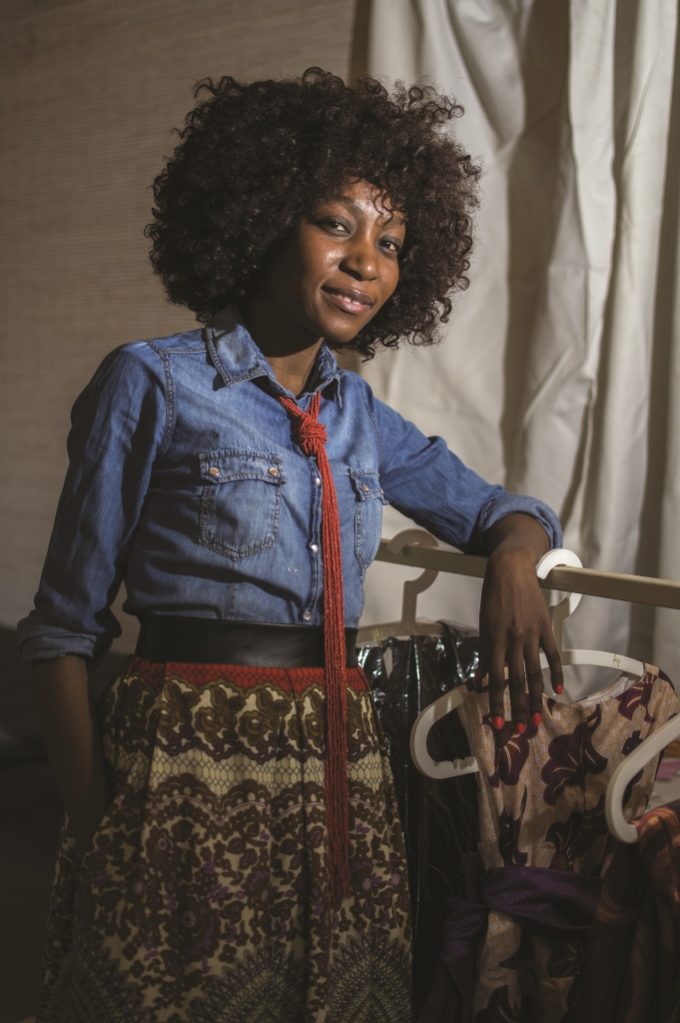A white sheet and a wooden mat hung tastefully from a truss divide Keneilwe Mampuru’s double garage workshop. In this space is a rack filled with colorful African fabrics, a cluttered desk, a sewing machine and an ironing board also laden with cloth.
This is Mampuru’s modest design studio, in the upscale suburb of Silver Lake, east of South Africa’s capital Pretoria, where she brings her ideas to life, under her eponymous label, Kente by Keneilwe, creating African fashion for Africa.
“African fashion is heading for bigger things now. A lot of Europeans and Americans are fast becoming aware of African fashion and are wearing our garments. For example, Louis Vuitton recently launched a bag made out of sacks we, as Africans, used as shopping bags in the eighties already,” says Mampuru.
Mampuru emphasizes how global fashion shows are highlighting African creativity, consistently looking to the continent for trends.
The 34-year-old designer is quite the role model for African fashion herself. Sporting a curly afro, Mampuru is in a denim shirt with rolled-up sleeves. Her tie is made of red-beaded string. Her skirt is in African print, knee-length, but oval and full-length at the back, revealing black wedge heels.
Loading...
“I usually wear clothes I have designed myself,” she says.
Born and raised in a four-room house in Atteridgeville, a township west of Pretoria, Mampuru always had a yen for designing. Her mother was a radiographer and her late father, a clerk at a local hospital.
After sending her to a local primary school, her parents managed to get her to the Pretoria High School For Girls, despite the fact that money was always an issue.
“My parents always did their best to take us to good schools, and off the streets,” says Mampuru.
“Lack of good education is a major factor for our youth going off the rails because they feel unworthy if they’re not good in maths or science. They don’t know if they’re gifted in other things like art, dancing or even entrepreneurship.”
Growing up, Mampuru was always inspired by American soul singer Erykah Badu’s dress sense and her trademark head wrap. It was at this stage she fell in love with fashion, designing her school mates’ matric dance outfits.
“I couldn’t sew at that time but I really enjoyed designing,” she says.

After matric, Mampuru did short courses with UNISA in Pretoria and later did a two-year fashion design course at Tshwane University of Technology. In 2003, she saw an advertisement for call center agents and applied. This soon found her working for banking giant ABSA, where she stayed for six years, but her heart was not in her job.
“I remember every morning going to work and I knew I didn’t belong there. I’d get a headache every time I’d go into work, which was weird, but when I got home, I’d be fine,” she recalls.
In her off-duty hours, Mampuru would design outfits for clients – it was a stress-buster.
Mampuru’s career took off at ABSA and in 2009, she was a quality assurer at the Small Business Department. That’s where she was inspired to start her own business.
“I saw people opening up their own business accounts and how they ran them which really inspired me. After weighing out my options, I decided that if I could take fashion seriously, I could make a success out of it.”
Mampuru resigned her bank job to pursue her passion. With the help of her father, she bought sewing equipment and officially launched her brand.
Things weren’t about to get better though. Not having a regular salary was one of the harsh realities.
“After I quit, reality hit me. The clients I did outfits for [previously] weren’t there. I missed my salary so much and I had to sell my car for survival,” says Mampuru.
Fast forward to now and her label Kente by Keneilwe is worn by African diplomats.
Some of her clients include Senegalese-based Asanda Mashele and Cote d’Ivoire physiotherapist Marie Tshibangu, who have written rave reviews about Mampuru’s outfits on her website.
Mampuru fuses traditional with contemporary design. For a traditional bridal gown, you would pay about $746 while a dance or cocktail dress starts at about $552. She receives more than two dozen orders a month.
“The Kente cloth is from Ghana and originally worn by kings on special occasions. That’s how we basically want our clients to feel when they’re wearing my designs. To feel ‘I’m the queen’ and feel all superior,” says Mampuru.
Mampuru is inspired by South African businesswoman Phuti Mahanyele, who, she says, epitomizes strength, beauty, brains and humility.
In the future, Mampuru is hoping to dress ministers across Africa and also influential women. She mentions a few, including South African author Kagiso Msimango, AIDS activist Criselda Kananda, Hollywood actor Charlize Theron, Erykah Badu and South African band Freshly Ground.
“I would like to dress successful women, who are making a significant change in other women’s lives, through self-love, spirituality, or encouraging them to invest in themselves,” says Mampuru.
She has proven that a sewing machine, a few colorful threads and big dreams can take African creativity far.
Loading...
